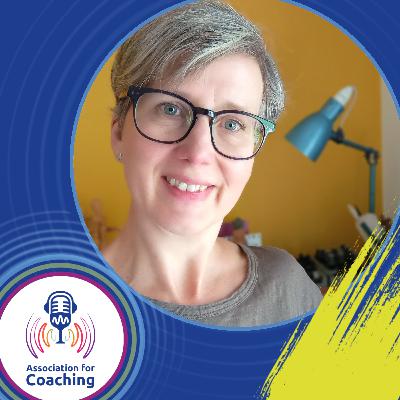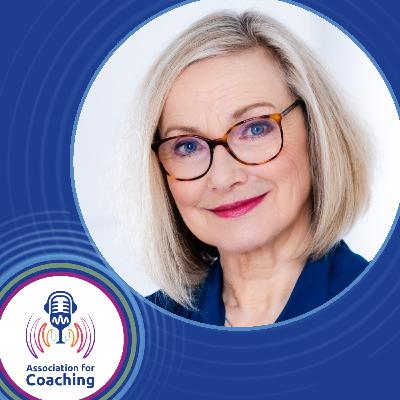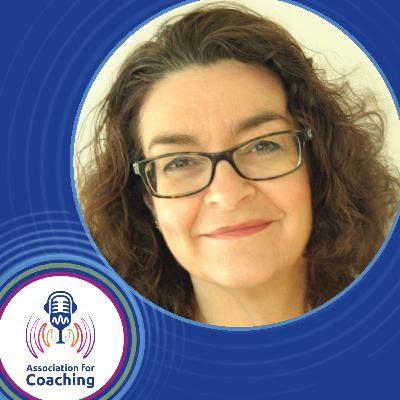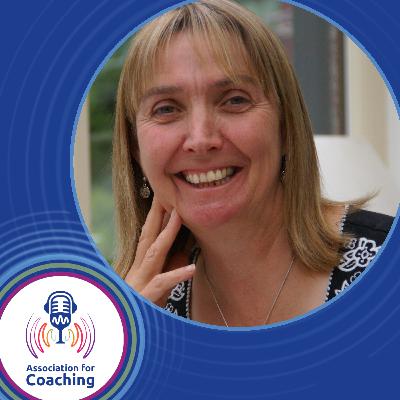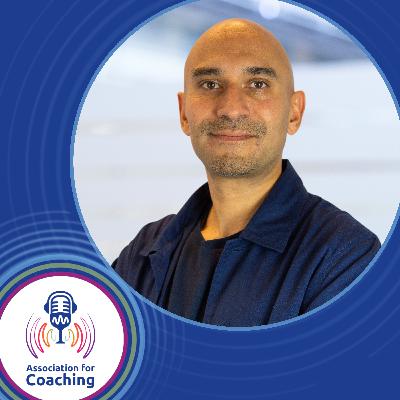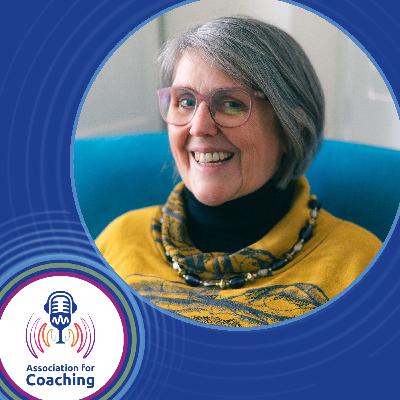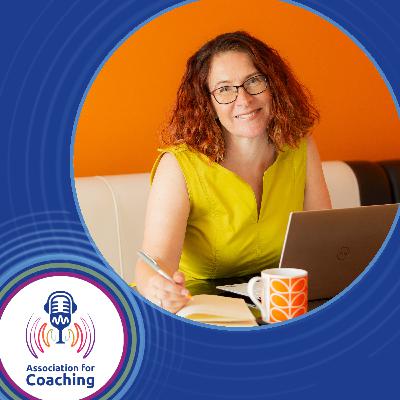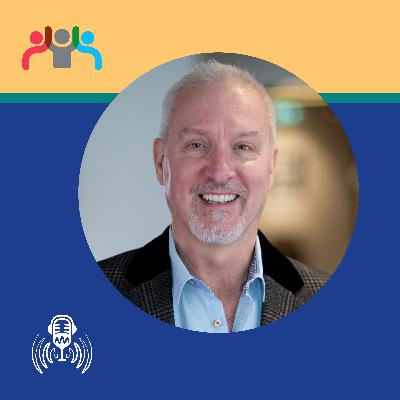Discover The AC Podcast
The AC Podcast

The AC Podcast
Author: Association for Coaching
Subscribed: 62Played: 1,743Subscribe
Share
© (c) 2020-2024 Association for Coaching
Description
Welcome to the Association for Coaching (AC) Podcast Channel.
Enjoy our educational, thought-provoking conversations as our diverse range of hosts speak with coaches, thought leaders, academics and industry innovators. Listen to our weekly episodes to gain actionable tools and proven techniques to elevate your personal and professional development, boost your coaching business and become a better coach for your clients. Whether you're a seasoned professional or just starting, this is your go-to resource for growth and success in the coaching industry.
All our podcast and guest resources are available in our Digital Learning Hub, which includes an extensive library of webinars, interviews, and a portfolio of live events to help you develop and increase your coaching expertise. https://www.associationforcoaching.com/page/dl-hub
Enjoy our educational, thought-provoking conversations as our diverse range of hosts speak with coaches, thought leaders, academics and industry innovators. Listen to our weekly episodes to gain actionable tools and proven techniques to elevate your personal and professional development, boost your coaching business and become a better coach for your clients. Whether you're a seasoned professional or just starting, this is your go-to resource for growth and success in the coaching industry.
All our podcast and guest resources are available in our Digital Learning Hub, which includes an extensive library of webinars, interviews, and a portfolio of live events to help you develop and increase your coaching expertise. https://www.associationforcoaching.com/page/dl-hub
262 Episodes
Reverse
In this episode, host Kate Jenkinson talks to Nathan Broad, IT Director at Certas Energy, for an insightful conversation on how leaders can create inclusive workplaces. Nathan shares both personal and professional experiences, highlighting the power of organizational kindness, supportive policies, and community-driven approaches to inclusion. They explore practical initiatives such as quiet spaces, community groups, and tailored IT solutions that help neurodiverse employees thrive. The discussion also unpacks common misconceptions and emphasizes the value of reflective listening and feedback as tools for building stronger, more supportive workplaces. Nathan also speaks candidly about the role of leadership in championing neurodiverse talent, the challenges organizations face in creating truly inclusive cultures, and the progress still to be made. By shifting mindsets, addressing language and narratives around neurodiversity, and embedding feedback loops into workplace practices, leaders can build environments where every employee feels empowered and valued. This episode is both a call to action and a practical guide for coaches, leaders, and organizations committed to fostering more inclusive, compassionate communities. You will learn: · Why organizational kindness is good business · Why a top-down approach is essential · How employee accountability empowers and informs workplaces ‘Business will be more effective if we do the right things by people’ Don’t forget to subscribe, rate, and leave us a review! Your feedback helps us bring you more valuable content. For the episode resources and guest bio, please visit: https://www.associationforcoaching.com/page/dl-hub_podcast-channel-neurodiversity-in-workplace-organizational-kindness-inclusive-leadership
Looking for practical ways to make recruitment more inclusive and supportive of neurodivergent talent? In this episode, host Kate Jenkinson sits down with Mark Crawley, founder of Diversita, a consultancy neurodiversity consultancy that help organizations become more neuro inclusive through training, recruitment and awareness. Mark shares his personal motivation for this work, unpacks the barriers many neurodivergent candidates face, and explains why equity—not equality—is key to creating fair opportunities. Together, they explore actionable strategies such as skills-based recruitment, making reasonable adjustments, and equipping managers with the right training. Mark also introduces Diversity’s new digital platform for neuro-diverse job seekers and shares inspiring success stories that show what’s possible when organizations truly embrace neurodiverse talent. Listeners will come away with two powerful takeaways: first, the importance of shifting recruitment systems to recognize strengths rather than screen out difference; and second, the vital role coaches play in helping create supportive processes and environments where neurodivergent individuals can thrive. Whether you’re a coach, supervisor, HR professional, or organisational leader, this conversation is packed with insights, tips, resources, and next steps to help you attract, hire, and retain the incredible neurodivergent talent out there. You will learn: · Why neuro-inclusive recruitment is so important · How organisations can start their journey to embracing neurodivergent talent · Advice for neurodivergent job seekers ‘We wanted to make sure we represented jobseekers, but equally so we wanted to make sure we trained and educated organizations. and that a twofold approach is something that no other real recruitment agency or organization are really doing.’ Don’t forget to subscribe, rate, and leave us a review! Your feedback helps us bring you more valuable content. For the episode resources and guest bio, please visit: https://www.associationforcoaching.com/page/dl-hub_podcast-channel-neurodiversity-in-workplace-recruitment-neurodivergent-talent
In the first episode of a new series – Neurodiversity in the Workplace – host Kate Jenkinson is joined by Ellie Hand, Senior HR Advisor and Training Lead at Bhayani Law, to discuss how organisations can move beyond legal compliance to create truly inclusive workplace cultures that celebrate difference and empower individuals to thrive. Ellie shares practical advice on tackling misconceptions, implementing reasonable adjustments, and the importance of empathy and clear communication in supporting neurodivergent employees. She explains what good feedback looks like and delves into the risks organisations face when they neglect neuro-inclusion, including both legal exposure and commercial risk. Ellie emphasises the role of leadership buy-in, collaboration, and valuing lived experiences as workplace champions, when shaping inclusive practices. With insights into intersectionality, unconscious bias, and the impact of effective feedback, listeners will leave with a richer understanding of how to support neurodivergent colleagues and embed meaningful culture change that benefits everyone. Whether you are a coach, HR professional, leader, or part of an organisation seeking to do better, this conversation offers practical strategies and thought-provoking takeaways. You will learn: · Why moving beyond compliance is key to building inclusive and supportive workplace cultures · How reasonable adjustments, empathy, and effective feedback can transform employee experiences · The risks of neglecting neuro-inclusion and the importance of leadership commitment and culture change ‘Organisations are starting to recognise that neurodiversity isn't just a legal issue. It's about creating an environment where all minds can thrive, regardless of where that thrives sits.’ Don’t forget to subscribe, rate, and leave us a review! Your feedback helps us bring you more valuable content. For the episode resources and guest bio, please visit: https://www.associationforcoaching.com/page/dl-hub_podcast-channel-neurodiversity-in-workplace-compliance-inclusion-workplace-culture
Welcome back to another episode of our Day in the Life podcast series, where we meet real coaches living real lives. In this inspiring conversation, host Maxine Bell sits down with Conny Weyrich, an arts-based and trauma-informed coach from Melbourne, Australia. Conny shares her remarkable mid-life journey from a corporate career in marketing and consultancy to art therapy, and ultimately into the world of coaching. Her story offers valuable insights for coaches and supervisors who are curious about weaving creativity, compassion, and trauma-awareness into their practice. In this episode, Conny shares what art-based coaching really means, the significance of being a trauma-informed coach, and how curiosity and compassion guide her client work. She reflects on her typical workweek, memorable coaching moments, and the deep importance of supervision and self-care. Whether you’re an experienced coach or just beginning your journey, Conny’s wisdom and practical tips will encourage you to reflect on your own practice, become clear of the scope of your own practice, focus on the development of relational skills and embrace creativity as a pathway to growth. A highly recommended listen for coaches, supervisors, and anyone interested in the intersection of art, healing, and coaching. You will learn: · The role of creativity and arts-based methods in helping clients grow · Why being trauma-informed is invaluable for sustainable, ethical coaching · Why self-care, self-awareness and supervision make you a better, more effective coach “I would say the skills around, being in relationship, being present, being attuned to the client and to the process are probably always more important than any skills around a particular coaching framework or coaching tools.” Don’t forget to subscribe, rate, and leave us a review! Your feedback helps us bring you more valuable content. For the episode resources and guest bio, please visit: https://www.associationforcoaching.com/page/dl-hub_podcast-channel_day-in-the-life-of-coaches-art-based-trauma-informed
Can we truly make coaching spaces inclusive? This powerful closing episode of our Coaching Supervision Uncovered series invites you into a dynamic panel conversation on the role of Diversity, Equity, and Inclusion (DEI) in coaching supervision. Host Helen O’Grady is joined by master coaches Shruti Sonthalia, Dumi Magadlela and Claire Pedrick as they unpack how supervision can become a sacred space for reflection, authenticity, and growth. Together, they explore how supervisors can model courage, examine safety, shame and co-design spaces where vulnerability becomes a strength rather than a risk. The conversation dives deeply into identity, systemic, cultural and continental context - highlighting the ways power dynamics and intersectionality shape supervision relationships. By weaving personal insights with practical reflections, the panellists show how re-humanisation, presence, and recognition of interconnectedness can unlock truly inclusive coaching spaces. As the series finale, this episode is both a celebration of what has been uncovered and an open invitation to continue the dialogue on inclusion as a living, co-created process. You will learn: · How to hold supervision as a sacred space that enables authentic reflection and growth · Why vulnerability, courage, and cultural awareness are essential to inclusivity. · Practical ways supervisors can co-create inclusive environments that allow coaches to come as they are 'We can’t declare that a space is safe. We also can’t declare that a space is inclusive because as the supervisor, that’s not our decision.' Don’t forget to subscribe, rate, and leave us a review! Your feedback helps us bring you more valuable content. For the episode resources and guest bio, please visit: https://www.associationforcoaching.com/page/dl-hub_podcast-channel-coaching-supervision-uncovered-identity-power-inclusion
How does power truly manifest in coaching supervision? In this episode, host Helen O’Grady sits down with executive coach and supervisor, Shruti Sonthalia to unpack the often overlooked but critical dimension of power in supervision. Together, they explore how power is an inherent element of all human relationships and why acknowledging its presence is essential for supervisors, coaches, and leaders. From "power over" and "power under" to cultivating shared power, this episode dives deep into the ways identity, privilege, and cultural context influence supervision relationships. Listeners will hear what red flags indicate power imbalance, and practical strategies that foster shared power in supervision. The conversation also sheds light on systemic dynamics, the challenges supervisors face in balancing relational warmth with ethical responsibility, and the transformative potential of curiosity and humility. If you’re a coach, coaching supervisor, or leader coach seeking to navigate complex dynamics with greater self-awareness and impact, this episode offers a rich and thought-provoking guide to embodying shared power. Key Learning Points: · Why power is an unavoidable and essential element of all coaching supervision relationships · How supervisors can consciously foster shared power dynamic within the coaching supervision relationship · The impact of broader systemic and identity issues on a shared power relationship “When you are able to name what needs to be named and really listen to the unspoken, you are in service to both the coach and the larger systems they serve and the power dynamics that might exist in the systems.” Don’t forget to subscribe, rate, and leave us a review! Your feedback helps us bring you more valuable content. For the episode resources and guest bio, please visit: https://www.associationforcoaching.com/page/dl-hub_podcast-channel-coaching-supervision-uncovered-power-privilege-identity
What if coach supervision wasn’t just about reflecting—but about completely rethinking how you grow? In this episode, host Helen O’Grady speaks with Dr. Elizabeth Crosse about how coach supervision can foster real coach development – a dynamic, critically reflexive practice that meets coaches exactly where they are. Drawing on her research, Elizabeth introduces a practical typology for growth through three distinct lenses: the craft of coaching, self-work (the internal work) and the art of coaching (the external learning that comes through coaching). Together, they explore the non-linear, cyclical nature of coach development, and how supervision encourages curiosity, critical thinking, and self-awareness for more effective, holistic coaching. Elizabeth also shares insights from her Developmental Mindset Inventory— a tool designed to help coaches and supervisors assess and expand their developmental approach. She explains how supervision can meet coaches where they are, balancing professional capability with personal capacity, and turning learning into meaningful growth. This episode is both a framework for practice and an invitation to slow down, notice what resonates, and engage with your own evolving developmental path. You will learn: · Why supervision must support both professional capability (knowledge and skills) and personal capacity (navigating complexity). · That development is not about adding more apps — it’s about upgrading your system · How to be critically reflexive instead of just reflective "For me, development is something like happiness; you cannot guarantee you'll be happy, but you can do things that are more likely to enhance your ability." Don’t forget to subscribe, rate, and leave us a review! Your feedback helps us bring you more valuable content. For the episode resources and guest bio, please visit: https://www.associationforcoaching.com/page/dl-hub_podcast-channel-coaching-supervision-uncovered-coach-development
In this episode, host, Helen O’Grady is joined by Michelle Lucas, an accredited Master Executive Coach and Supervisor, who explores the vital role of reflective practice in coaching supervision. She clarifies the definition of reflection and reflexivity in coaching; it’s iterative nature and application in various contexts. Michelle discusses the three methods of reflection: self-supervision, peer supervision and professional supervision and the challenges coaches face in engaging reflective practice. She explains how to recognise individual reflective practices and addresses the common barriers. Michelles stresses the value of experimentation with different reflective methods and examines the difference between supporting new and more experienced coaches, highlighting the need for intentional, regular practice. Listeners gain practical insights and resources to deepen their reflective habits and enhance their coaching effectiveness. You will learn: · The importance of taking a diversity of approaches when reflecting · How supervisors can encourage coaches to broaden their reflective repertoire · How to tailor reflective activities that work for you - there are no "shoulds" here! 'For me, reflection is a really iterative process; it doesn't stop, it just evolves and often comes back several times before we feel resolved.' Don’t forget to subscribe, rate, and leave us a review! Your feedback helps us bring you more valuable content. For the episode resources and guest bio, please visit: https://www.associationforcoaching.com/page/dl-hub_podcast-channel-coaching-supervision-uncovered-reflective-practice-reflexivity
In this insightful episode, host Helen O’Grady and guest Jo Birch, an award-winning supervisor and executive coach, explore the complexities of mental health in coaching and supervision. They discuss the importance of clear contracts, boundaries, and competence when addressing mental health issues, the challenges of confidentiality, and the need for self-awareness and reflection on personal beliefs about mental health. The conversation highlights the value of supervision as a safe and reflective space, the misunderstandings around mental health, and the necessity for coaches and supervisors to develop confidence and fluency in these sensitive conversations. Jo shares the challenges of maintaining confidentiality and navigating sensitive disclosures, as well as the interplay between coaching and therapy, and provides strategies for developing skills in noticing and responding to mental health concerns. This conversation offers easily applied actions you can take, as well as encouraging further enquiry, ongoing learning and open dialogue to better support clients and yourself. You will learn: · How to hold the contract for the work, while being human and compassionate · How to develop competence – skills and knowledge · How to grow in confidence You can find further resources on mental health here. ‘Fluency in being able to talk about mental health issues is it's a skill for life, not just in our professional work.’ Don’t forget to subscribe, rate, and leave us a review! Your feedback helps us bring you more valuable content. For the episode resources and guest bio, please visit: https://www.associationforcoaching.com/page/dl-hub_podcast-channel-coaching-supervision-uncovered-mental-health-essential-skills
In this fascinating episode, host Helen O’Grady is joined by executive coach and coach supervisor Neel Arya to talk about developmental artistry - a creative, embodied approach to coaching and supervision and its relevance in times of significant change. Neel explains how this philosophy, co-developed with Carissa Bub, encourages practitioners to embrace uncertainty, experimentation, and the exploration of liminal spaces – the ‘messy middle’ of growth - and their significance in the developmental process. Neel explains cultural dimensions and individual personality's influence on the openness to developmental artistry, and they discuss using creative techniques, such as works of art and poetry, to foster deeper awareness and learning. The conversation highlights the importance of presence, playfulness, and courage, challenging traditional reliance on structured models and inviting coaches to explore emergent, experiential ways of knowing. Neel also shares his experience using the dark and invites listeners to join his Dark Workshop series this autumn, using the discount code found on the AC website below. You will learn: · The concept of ‘developmental artistry’ in coaching and supervision · How to apply developmental artistry for both experienced and novice coaches · How the dark can be used to explore liminal spaces “What we're trying to do with development artistry is, is to say, well, actually, how might we go about the art of development by really focusing in on the embodied, the experiential, the emergent things which are entangled…to move out of, out of our heads into a deeper, more natural felt sense and embodied intelligence. And to learn and to develop through experience.” Don’t forget to subscribe, rate, and leave us a review! Your feedback helps us bring you more valuable content. For the episode resources and guest bio, please visit: https://www.associationforcoaching.com/page/dl-hub_podcast-channel-coaching-supervision-uncovered-developmental-artistry-emergent
In this episode, host, Helen O’Grady interviews ADHD coach and trainer Katie Friedman about coaching supervision through a neurodivergent lens. Katie explains the concepts of neurodiversity and neurodivergence, addresses common misconceptions, and highlights the importance of psychological safety and inclusivity in coaching. The conversation explores the challenges neurodivergent individuals face in identity integration, the need for humility and awareness of positionality, and the value of specialized training. Katie also discusses the evolving landscape of ADHD coaching and her belief that specialist coaching will replace the medical models and continue to grow, and the transformative power of community and ongoing self-discovery. This episode offers a nuanced and compassionate look at building inclusive coaching practices that truly support all minds. You will learn: · The difference between neurodiversity and neurodivergence · The many misconceptions about neurodiversity · The role of supervision and specialized training in creating and supporting inclusive coaching spaces 'The assumption that you can coach anyone is really lacking in humility. It erases my difference and is not respectful.' Don’t forget to subscribe, rate, and leave us a review! Your feedback helps us bring you more valuable content. For the episode resources and guest bio, please visit: https://www.associationforcoaching.com/page/dl-hub_podcast-channel-coaching-supervision-uncovered-neurodiversity-adhd-inclusion
In this episode Claire Pedrick, master coach and co-author of ‘The Human Behind the Coach,’ joins host, Helen O’Grady to explore the vital role of humanness in coaching supervision. They discuss the importance of authenticity, vulnerability, and why the supervisee, rather than supervisor, decides if a space is safe or not. Claire shares personal insights on power dynamics, the value of self-reflection, and the ethics of supervisors bringing their humanity to their sessions. The conversation highlights the evolving nature of supervision, the need for continuous growth, and the courage required to foster genuine human connection within coaching relationships. You will learn: · What humanness in supervision means · The benefits of being human and vulnerable as a supervisor · The concept of self-supervision and the significance of reflection “If you're asking me to disclose, explore, and dig, but you're acting like a robot because you know all your great questions and you're not being human, I can't show up either." Don’t forget to subscribe, rate, and leave us a review! Your feedback helps us bring you more valuable content. For the episode resources and guest bio, please visit: https://www.associationforcoaching.com/page/dl-hub_podcast-channel-coaching-supervision-uncovered-humaness-vulnerability-authenticity
In this episode, we take a deep dive into coaching readiness and coachability, as host Helen O’Grady is joined by Clare Norman, Master Certified Coach and author of two key coaching books. When coaches come to supervision doubting themselves, because their client is not engaged, Clare encourages supervisors to go beyond asking what the contract says, asking a second question, ‘Was the client and their organization coaching ready?’ With this question in mind, Clare explores the difference between ‘coaching readiness’ and ‘coachability’. She emphasizes the crucial role of organizational ‘coaching custodians’ in aligning coaching with strategic goals and the importance of specific compatibility calls that focus on four key questions to assess whether coach and client are a good match. Clare also discusses the misconception that coaching is universally beneficial for everyone. This episode offers clarity and practical tips for coaches and organizations, highlighting the need for supervision to unpack coaching readiness issues, ethical practice and a systemic approach to successful coaching outcomes. You will learn: · The definition and differentiation of "coachability" and "coaching readiness”. · Ethical considerations and complexities in coaching relationships · The value of supervision for coaches to reflect on their experiences with coaching readiness. “Discussing coaching readiness is a key area for supervisors to explore with their supervisees.” Don’t forget to subscribe, rate, and leave us a review! Your feedback helps us bring you more valuable content. For the episode resources and guest bio, please visit: https://www.associationforcoaching.com/page/dl-hub_podcast-channel-coaching-supervision-uncovered-coachability-readiness-custodian
Do you really understand the role of contracting in supervision? This week, join host Helen O’Grady as she speaks with coaching psychologist and supervisor, Anna Springett as they discuss the skill and practice of contracting in supervision. They discuss how it compares to contracting in coaching and the broad range of factors that practitioners need to consider. Anna explains the psychological aspects of containment in supervision and the significance of checking assumptions in supervision relationships. They explain what questions a coach can ask when looking for a supervisor and explore cultural differences in perceptions of time and group dynamics, emphasising the need for ongoing, adaptive contracting. Anna introduces her 8 Ps model and what emerging trends and challenges she sees for coaching supervision, including technology and global awareness. This conversation defines the vital role contracting has in supervision, with tips and insights to help both supervisors and coaches improve their contracting practices. You will learn: · What contracting is and its pivotal role in supervision · The psychological concepts of containment · What questions a coach can ask to find the right supervisor “I genuinely believe that contracting is a core practice; everything else plays out within the contract, the container that we create.” Don’t forget to subscribe, rate, and leave us a review! Your feedback helps us bring you more valuable content. For the episode resources and guest bio, please visit: https://www.associationforcoaching.com/page/dl-hub_podcast-channel-coaching-supervision-uncovered-contracting-containment
Join us for the first episode of a new podcast series: Coaching Supervision Uncovered – an 11-part series exploring the fascinating world of coaching supervision and how it shapes exceptional coaches. Each episode delves into a distinctive aspect of supervision with leading practitioners, uncovering the nuanced ways supervision enhances coaching practices, supports wellbeing and drives professional development. Our host, Helen O’Grady, is joined by Marie Faire, a master executive coach and supervisor, to introduce the topic and talk about the essential role of coaching supervision. Marie explains what supervision is, emphasizing trust, self-reflection and continuous learning. The conversation explores differences between supervising novice and experienced coaches, the benefits of individual and group supervision, and common misconceptions about supervision. Marie also discusses the importance of practical experience, the supervisor’s dual role as supporter and challenger, and the evolving future of supervision in coaching. You will learn: · The definition and essence of coaching supervision · The key benefits of regular supervision for coaching · How to find a good supervisor that is right for you Whether you’re a seasoned supervisor, a coach curious about supervision, or simply interested in the dynamics of reflective practice, this series offers illuminating conversations "I think coach supervision is just the best CPD that a coach can do because it's targeted. It's what you bring; it's your agenda. Whatever you bring, we explore it together. That's why I call myself a fellow traveller—because it's a mutual exploration." Don’t forget to subscribe, rate, and leave us a review! Your feedback helps us bring you more valuable content. For the episode resources and guest bio, please visit: https://www.associationforcoaching.com/page/dl-hub_podcast-channel-coaching-supervision-uncovered-introduction-benefits-reflective
In this inspiring episode of our ‘Day in the Life of’ podcast series, host Maxine Bell sits down with Helen O’Grady, an experienced coach and supervisor who brings her background in paediatric nursing into her coaching work within the health, social care, and education sectors. Helen shares her powerful journey from healthcare to coaching, shedding light on the unique challenges and opportunities in supporting professionals working on the front lines. Maxine and Helen explore how coaching can transform leadership and client care in health and social care, the emotional toll of frontline work, and how coaching supports burnout prevention and emotional wellbeing. They also discuss the persistent funding challenges and why coaching should be prioritised in high-impact environments like the NHS, social work and education. Helen also discusses the importance of supervision for coaches and the evolving conversation around professional regulation in the coaching field. She shares honest reflections on the mindset shifts required in helping professions—from "rescuing" to empowering clients—and why self-trust and community support are vital for sustainable coaching practices. Full of insights and tips, Helen’s passion and care for coaching and supervision light up the conversation. If you are feeling uncertain about coaching in any way or seeking a new perspective and purpose in your practice, this podcast episode is for you! · Discover the value and impact of coaching in the health, social care, and education sector · Learn how to shift from a "rescue" mindset to one that supports agency and empowerment · Understand the critical role of supervision in sustaining ethical, reflective, and resilient coaching "From the moment I discovered coaching, I was like, wow, this is fantastic. I still get so much joy from all aspects of it; I feel very blessed to have found it." Tune in next week as Helen hosts a new 11-part podcast series: Coaching Supervision Uncovered! Don’t forget to subscribe, rate, and leave us a review! Your feedback helps us bring you more valuable content. For the episode resources and guest bio, please visit: https://www.associationforcoaching.com/page/dl-hub_podcast-channel_day-in-the-life-of-coaches-supervision-frontline-professionals-inspirational
In the final episode of our ‘Coaching as a Leader’ podcast series, Jen Kidby is joined by Linda Beatty, Senior Manager of Culture and Engagement in Bank of Ireland, to explore the growing role of leader coaches in formal coaching programs within organizations. They delve into how structured coaching engagements—distinct from day-to-day mentoring or informal support—can elevate leadership development across an organization. Linda shares her personal journey, while highlighting the practical considerations leader coaches must navigate - from contracting and the challenges of confidentiality to the importance of support systems and supervision. You'll discover why leader coaches bring unique value through their organizational insight and how they create psychological safety when coaching colleagues and employees. Learn the impact that leader coaches can have on colleagues within their organization and the organization itself, as well as the wider impact in the day to day lives of leader coaches themselves. Linda shares the rationale for utilizing leader coaches over external coaches. She offers invaluable insights, guidance and strategies that will both inspire and inform leader coaches and organizations considering formal coaching. We hope this series has inspired leaders, leader coaches and coaches supporting leaders. If you would like a more in-depth knowledge on this topic you can find the ‘Coaching as a Leader’ book in book shops and online. You will learn: · How formal coaching unlocks leadership development across the organization. · How structured frameworks and boundaries are essential. · How support systems, such as peer networks and coaching communities fuel success. “Formal coaching is a structured relationship between two people, the coach and the coach. And in an organizational setting, that's obviously a colleague or an employee…someone you don't know.” Don’t forget to subscribe, rate, and leave us a review! Your feedback helps us bring you more valuable content. For the episode resources and guest bio, please visit: https://www.associationforcoaching.com/page/dl-hub_podcast-channel-coaching-as-a-leader-formal-coaching-future-leaders
In this episode, Jen Kidby is joined by leadership development coach Tony Worgan to explore how the language leaders use shapes the culture, dynamics, and performance of their teams. Tony shares insights from his coaching practice, highlighting the power of being intentional with words and the impact of “discounting” language—subtle phrases that can unintentionally diminish a person’s contributions or confidence. He encourages leaders to shift from reactive or rescuing behaviours toward more open, curious coaching conversations. By staying present rather than striving for perfection, leaders can create psychologically safe environments where people feel heard, valued, and empowered. Tony also introduces practical tools from transactional analysis like the Drama Triangle which outlines the roles of Rescuer, Persecutor, and Victim in unproductive dynamics, and shows how to break out of these patterns. He explains the importance of “strokes”—small, meaningful recognitions that fuel trust and motivation—and offers advice on finding the right balance of positive and constructive feedback. The conversation emphasizes the long-term benefits of a coaching mindset, where thoughtful communication becomes a foundation for trust, growth, and stronger relationships at work. You will learn · How language shapes workplace culture and either builds or breaks trust. · Practical advice for leaders on open communication and addressing issues directly. · The ideal ratio of positive to negative ‘strokes’ for building trust and resilience in teams “Coaching transformed my whole experience of myself as a leader, my identity as a leader, and all my workplace relationships.” Don’t forget to subscribe, rate, and leave us a review! Your feedback helps us bring you more valuable content. For the episode resources and guest bio, please visit: https://www.associationforcoaching.com/page/dl-hub_podcast-channel-coaching-as-a-leader-language-workplace-culture
In this episode, host Jen Kidby is joined by coaches and co-authors Katy McGregor and Ross Hunter to explore the benefits and challenges of letting go of expertise as a leader coach, highlighting how identity, values, and experience shape leadership styles. They unpack the tension leaders have between offering expert advice or stepping back to empower others, and discuss the importance of self-awareness, creating a collaborative environment, as well as the need for leaders to ask insightful questions rather than provide answers. Katy and Ross share personal stories and tools to help leaders foster cultures of learning and encourage leaders to experiment with coaching techniques and embrace continuous learning. Listen and gain practical strategies for loosening the grip on technical expertise and embracing a more collaborative, question-led approach. You will learn: · The necessity of fostering a culture of inquiry and valuing diverse perspectives within teams. · The role of cultural expectations and organizational backgrounds in shaping coaching styles. · The necessity of fostering a culture of inquiry and valuing diverse perspectives within teams. “Once you begin to feel how great it feels to help somebody else solve a problem and find their own way through, it’s almost like switching out the dopamine and switching in the oxytocin.” Don’t forget to subscribe, rate, and leave us a review! Your feedback helps us bring you more valuable content. For the episode resources and guest bio, please visit: https://www.associationforcoaching.com/page/dl-hub_podcast-channel-coaching-as-a-leader-letting-go-expertise-identity-shift
In the premiere episode of our Coaching as a Leader podcast series, host Simone Sweeney talks to coach, supervisor and author Jen Kidby, and AC Head of Corporate Membership and Accreditation, Victoria Leath, to discuss the important topic of leader as coach and the launch of the AC’s new book: Coaching as a Leader. Together, they share the inspiration behind the book and explore why coaching skills are now essential for leaders navigating today’s complex, people-centred workplaces. Designed to set the stage for the series, this conversation offers a compelling introduction to the evolving role of leadership in driving culture, engagement, and performance through coaching. Jen and Victoria delve into the core themes of Coaching as a Leader, including the shift from directive, top-down management to a more collaborative, coaching-led leadership style. They highlight how key coaching competencies—such as emotional intelligence, active listening, and self-awareness—are crucial for fostering trust, clarity, and resilience within teams. The episode also offers practical guidance for leaders looking to integrate a coaching mindset into their everyday practice. Jen and Victoria emphasize the importance of aligning these skills with organizational values and strategy to create lasting impact, and the growing trend of coaching as an essential component of organizational culture post-pandemic. An inspiring conversation for leaders of any level, as well as the coaches supporting them in our ever-changing world. You will learn: · Coaching-oriented leadership fosters stronger, more supportive organizational cultures. · Core coaching skills—like self-awareness, active listening, and emotional intelligence—are vital for effective modern leadership. · Aligning coaching practices with organizational purpose enhances both individual and business performance. “They're realizing that coaching is becoming a must, with people and strategies. Companies that are focusing on coaching cultures see a higher engagement, for various different things like innovation and retention.” Don’t forget to subscribe, rate, and leave us a review! Your feedback helps us bring you more valuable content. For the episode resources and guest bio, please visit: https://www.associationforcoaching.com/page/dl-hub_podcast-channel-coaching-as-a-leader-coaching-skills-leadership-book





